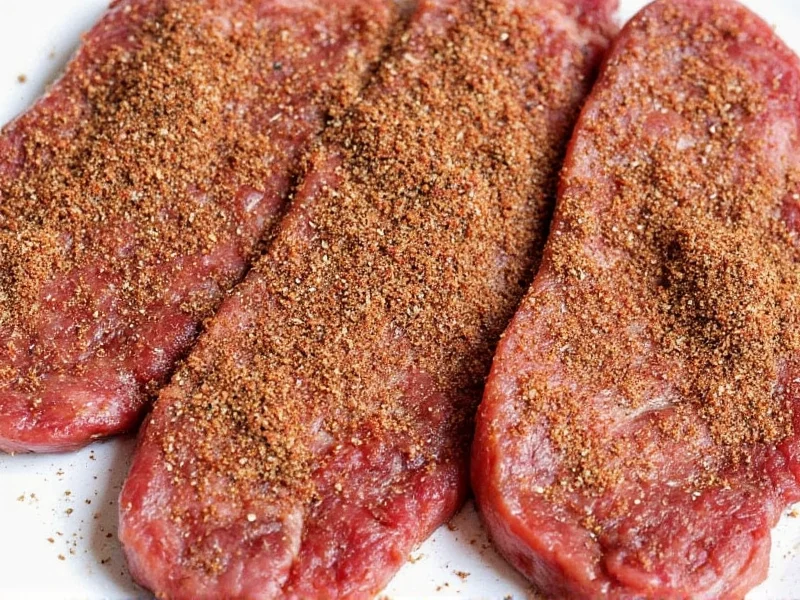When seasoning steak, less is often more. Professional chefs and home cooks alike have discovered that complex spice blends can overwhelm high-quality beef rather than enhance it. The perfect steak seasoning balances flavor enhancement with simplicity, allowing the natural richness of the meat to shine through while adding just enough complexity to elevate the dining experience.
The Science Behind Simple Steak Seasoning
Understanding why minimal seasoning works best begins with how salt interacts with meat. When applied properly, salt dissolves and is absorbed into the surface layers of the steak through osmosis. This process not only seasons the meat but also helps retain moisture during cooking. The 45-minute window before cooking allows time for this process to occur while the surface dries—critical for achieving that coveted Maillard reaction when the steak hits the hot pan or grill.
Garlic powder provides depth without the risk of burning that fresh garlic carries at high temperatures. Unlike fresh garlic, which contains moisture that can steam the steak surface, powder integrates seamlessly into the seasoning crust. Black pepper adds aromatic complexity that complements beef's natural umami without overpowering it.
Perfecting Your Basic Steak Seasoning Ratio
While the 1:½:¼ ratio of salt:pepper:garlic powder works for most steaks, adjustments may be needed based on variables like cut thickness, meat quality, and personal preference. The table below shows recommended adjustments for different scenarios:
| Steak Characteristic | Salt (per 12oz) | Pepper (per 12oz) | Garlic Powder (per 12oz) |
|---|---|---|---|
| Thin cut (under 1") | ¾ tsp | ¼ tsp | ⅛ tsp |
| Thick cut (1.5"+) | 1¼ tsp | ⅔ tsp | ⅓ tsp |
| Marbled cuts (Ribeye) | 1 tsp | ½ tsp | ¼ tsp |
| Lean cuts (Filet) | 1¼ tsp | ⅔ tsp | ⅓ tsp |
Step-by-Step Application Technique
Proper application matters as much as the ingredients themselves. Follow these steps for restaurant-quality results:
- Remove steak from refrigerator 60 minutes before cooking to reach room temperature
- Mix your quick steak seasoning blend in a small bowl
- Pat steak completely dry with paper towels—this critical step ensures proper searing
- Sprinkle seasoning evenly over all surfaces, pressing gently to adhere
- Allow seasoned steak to rest uncovered for 45 minutes
- Right before cooking, add a light coating of high-smoke-point oil (avocado or grapeseed)
This method creates the perfect conditions for a flavorful crust while maintaining a juicy interior. The resting period after seasoning allows the salt to begin its transformative work on the meat's surface proteins.
Variations for Different Flavor Preferences
Once you've mastered the basic quick steak seasoning, these simple variations can keep your meals interesting without complicating your routine:
Smoky Steak Seasoning
Add ¼ teaspoon smoked paprika to the basic blend. This quick steak seasoning variation works particularly well for grilling, adding depth that complements char marks. The smokiness enhances rather than masks the beef flavor, making it ideal for ribeyes and strip steaks.
Herb-Infused Steak Rub
Mix ½ teaspoon dried rosemary and ½ teaspoon dried thyme (crushed between your palms) into the basic blend. This simple steak seasoning recipe adds aromatic complexity that pairs beautifully with filet mignon or tenderloin. The herbs should be finely ground to prevent burning during high-heat cooking.
Spicy Steak Enhancement
For those who enjoy heat, add ⅛ teaspoon cayenne pepper to the basic blend. This quick steak seasoning modification provides a subtle kick that complements the richness of well-marbled cuts like ribeye. The heat should be noticeable but not overwhelming—just enough to create flavor contrast.
Common Quick Steak Seasoning Mistakes
Even experienced cooks make these seasoning errors that compromise results:
- Seasoning too late—Applying salt just before cooking doesn't allow time for surface drying, resulting in steamed rather than seared meat
- Using table salt instead of kosher—Table salt's finer grains and additives can lead to over-salting; kosher salt's larger crystals provide better control
- Adding wet ingredients—Liquid components like Worcestershire sauce prevent proper crust formation
- Overcomplicating the blend—More than 5-6 ingredients typically masks rather than enhances beef flavor
Seasoning for Different Cooking Methods
Your quick and easy steak seasoning approach should vary slightly based on cooking technique:
For cast iron cooking: Use the standard blend but reduce salt by 25%. The intense, direct heat of cast iron accelerates the Maillard reaction, and the seasoning can become slightly more concentrated during cooking.
For grilling: Increase pepper by 25% in your steak seasoning for beginners. The open flame can slightly diminish aromatic compounds, and the extra pepper ensures robust flavor throughout.
For reverse sear method: Apply half the seasoning before the low-temperature phase and the remainder just before the final sear. This prevents over-salting while ensuring proper crust formation during the high-heat finish.
Storage and Batch Preparation
One reason this quick steak seasoning approach works so well for busy home cooks is that you can prepare larger batches in advance. Store your basic blend in an airtight container away from light and moisture. Properly stored, it maintains freshness for up to 3 months. For best results, write the preparation date on the container—garlic powder begins losing potency after 90 days.
When making larger batches, maintain the 4:2:1 ratio (salt:pepper:garlic powder) for consistent results. A quart-sized mason jar can hold enough seasoning for approximately 24 standard steaks, taking less than 5 minutes to prepare.











 浙公网安备
33010002000092号
浙公网安备
33010002000092号 浙B2-20120091-4
浙B2-20120091-4